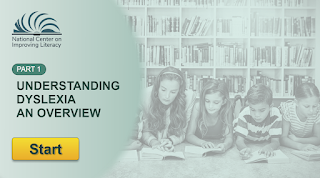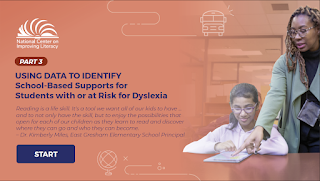It's Not Click-bait!
Or, I didn't mean it to be. I just have been thinking a lot about this quote:
"Special education students are often general education students first."
I have no idea who said that first, or even if it's a direct quote from anyone. What I do know is that when I see people argue against evidence-based, systematic reading instruction - and they do argue against it - often one of their talking points is that THOSE are the only students who need the heavy phonics drills and constant practice. Now, not addressing the "otherness" that people use for students who struggle and students who have disabilities...okay, I will address that briefly:
Sorry, I have to sidebar for this: You know people who believe in nurturing young readers with reading nooks and picture books to make happy learners are often the same people who do not beleive in the science of reading? They believe that you can make life-long lovers of reading if you just give them a comfy place to sit and interesting books to "read" (It's not really reading). These are also the same people who are just not concerned about the OTHER 20% (more like 40%), because they have a disability or a reading difficulty. They will say that THOSE kids are getting special education and so general education teachers don't need to be concerned about that.
I'm making sweeping generalizations here and I don't mean to sound anti-teacher. Teachers are only as good as what they know, and many are not taught in their teacher preparation programs how children actually learn to read. And school districts have NOT picked up the slack for this lack of education and understanding. Also, this has been going on in Teacher-Prep programs for decades, so it's self-purpetuating now. UGH.
And don't even get me started on using poor instructional practices in gen-ed and then expecting SPED to fix it!
But here's the key:
There are rarely students who come into school (kindergarten) with an IEP for a learning disability. (Some kids are going to come into school with an IEP - it's called something else in pre-k - already in place, generally, that's going to be students who are maybe in life skills classrooms or who have a visible disability. I can't speak to that experience because I'm just not familiar enough with it, so in this context, we are really talking about learning disabilities in reading, and in NO WAY do I want to diminish the struggles of the kids with other disabilities because when it comes down to the systems that hurt our kids, those systems are the same. That may be a conversation for another day.) And, there isn't really any reason that a student should come into K with an identified reading disability. So, that student is in the general education classroom. That student will stay in the general education classroom. If that student has no real behavioral concerns, they will simply slip through the cracks while they sit in the corner and look at the pictures in books while the teacher tells the parent that they will just get it one day.
UNLESS...unless all the students in the general education classroom are given evidence-based, cumulative, systematic instruction (or structured literacy, whatever you want to call it), AND that teacher has been trained in how children learn to read based on years of evidence from brain science and education research (among other things), AND that teacher continues to get high-quality professional development and coaching about and in the science of reading. AND that teacher has an administration in her building who ALSO understands how kids learn to read and supports her in her endeavor to get all her students reading.
THAT teacher, will see a student who continues to struggle even with high-quality instruction and can say, that child needs more help, let's put him in a smaller group, let's get him some additional instruction, let's give him more opportunities to respond. AND, if that doesn't work, she can say, let's talk about referring this child for an evaluation for special education. And let's actually have that referral in place by the beginning of first grade...and while we are at it, let's not wait! Let's go ahead and put that child in a one-on-one situation with a teacher, or a small group that is really going slow because they haven't reached mastery yet. Let's do that BEFORE the IEP is done!
This doesn't have to be so difficult!
I don't mean that this doesn't have to be difficult for that teacher or that student. This stuff IS difficult. It's hard to be a teacher and it's hard to be a student with a disability, but when you have teachers who are not trained appropriately, who are inadvertently doing more harm to students by using outdated methods to "teach" reading, that only makes it exponentially harder for everyone involved.
So it begs the question - WHY ARE WE STILL DOING IT THIS WAY?
There are so many free resources out there it's ridiculous. I was just looking at the OregonRTIi website and they have SO many great FREE resources!
Sidebar: don't get me started with the people who say RTI is a wait to fail model. It's NOT. It gets implemented that way in a lot of places, and they are doing it WRONG! Also feel free to check out MTSS which is very similar and doesn't have the baggage that RTI has (even though they are really similar). Again, I am specifically talking about RTI as a response to poor reading outcomes, not anything else that districts may be using Response to Intervention for. I'm looking at this strictly through the lense of how a response should happen if a child is struggling to read.
Resources
Oregon RTIi
- Video Recordings and Modules - So many great recordings from really knowledgeable presenters. Scroll down to the videos, but also don't miss the modules at the top!
- The Science of Reading Professional Development Modules - Do you need to deliver some PD in your school or district? Don't know where to start with the Science of Reading? Oregon RTIi has already done the heavy lifting for you! From the website: "These slide decks are intended as a resource for school leaders who provide professional development for staff in the area of literacy."





